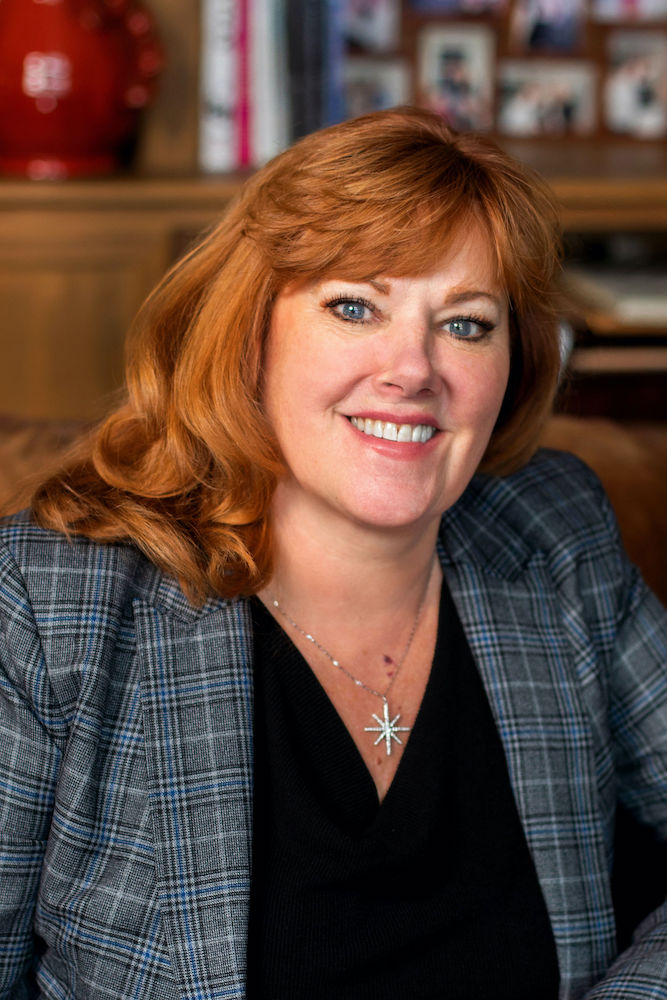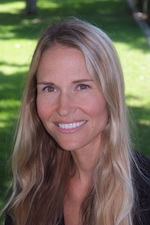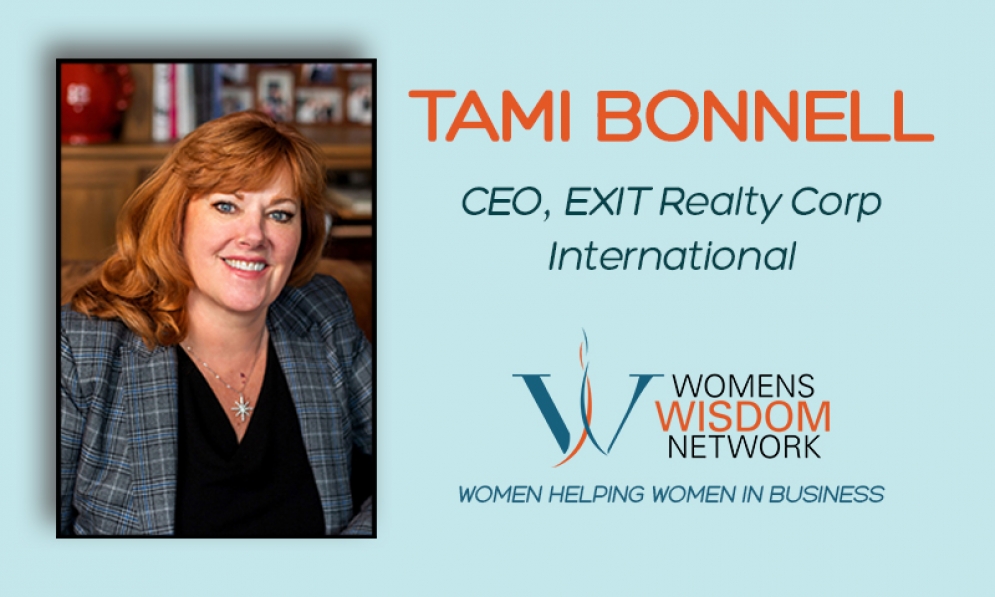 EXIT Realty Corp International’s CEO TAMI BONNELL is an internationally renowned leader in the real estate industry and was instrumental in building three major brands. Among her many achievements, she was recognized by Real Estate trend watcher, Stephan Swanepoel, three years consecutively as one of the 200 most Powerful and influential people in residential real estate, among the top 20 corporate executives and among the top 10 women leaders.
EXIT Realty Corp International’s CEO TAMI BONNELL is an internationally renowned leader in the real estate industry and was instrumental in building three major brands. Among her many achievements, she was recognized by Real Estate trend watcher, Stephan Swanepoel, three years consecutively as one of the 200 most Powerful and influential people in residential real estate, among the top 20 corporate executives and among the top 10 women leaders.
Ms. Bonnell has been a featured speaker at the NATIONAL ASSOCIATION OF REALTOR’S® convention to the Top 500 power brokers, The National Women’s Council REALTORS®, Inman News Connect Conference and the RIS Media’s Leadership Conference.
She was named to the National Association of Women in Housing & Real Estate Ecosystem ( NAWRB) Diversity & Inclusion Leadership Council (NDLIC).
Ms. Bonnell was honored by STEM connector as one of it’s 100 Corporate Women Leaders in STEM (science, technology, engineering and math).
Ms. Bonnell is a 30 plus year veteran of the real estate industry and joined EXIT Realty in 1999. She was appointed Chief Executive Officer in 2012.
She is a wife, mother of three and grandmother of three. In her spare time she is a martial artist, coach and referee.
It is no secret that children are attracted to video games like moths to light. From Minecraft to Roblox, children of today spend hours in front of screens both large and small, oftentimes much to the dismay of their parents and teachers.
Whether you have children of your own or not, you may believe these kids are using their time idly; however, it is actually quite the contrary. Believe it or not, they are likely learning while playing their favorite game, and furthermore, we as adults can learn a lot about these intuitive young individuals based on what they play.
This concept is part of a trend I first identified in the 1980s that I call gamification. Believe it or not, gamification is an increasing part of all of our lives in this new technological frontier, and is poised to educate adults just as much as video games educate children.
The Psychology of Play in Human Development
Many of the greatest technological advances in business and what motivates adults stem from the concept of open-ended play. Children have a boundless imagination and curiosity for the world around them, which they discover by playing.
To tie in gamification, whether it be a board game or a video game, play that involves working toward an end goal ties critical thinking skills to that discovery during play. Therefore, when young children use a computer to play a video game, there is a lot more going on than wrongfully perceived “wasted time.”
Outside of the game itself, they are using technology in a tactile sense, whether it be a controller, a touch screen, a mouse, you name it. Within the game, they are navigating a user interface, something we encounter every day in the personal and professional world, be it with our iPhones or a virtual teller at our bank.
Finally, there is the objective of the game. Take, for example, the popular video game Minecraft. The purpose of this game is to explore the virtual world, construct buildings and, yes, survive. It is an open-ended game, just as the Sims was for Millennials now navigating the adult world.
Gamification in Recreation
The concepts of gamification do not stop at children; they are massively evident in adult lives, both personally and, more importantly, professionally.
In the personal lives of adults, we see it everywhere in the fitness industry. FitBit is wearable technology that tracks your steps throughout the day, can sense when your heart rate is elevated while you work out, can even identify what workout you are doing, and maps out stats around your health in the corresponding smartphone app, allowing you to compete against yourself in your fitness journey.
Outside of wearable technology, interactive exercise equipment has gained traction, such as the Peloton, which gives you a virtual spin class trainer, personalized to encourage you to push yourself harder and defeat the “yesterday you.”
Professional Development and Gamification
It is easy to pinpoint gamification in recreation; however, what about in the professional world? Aside from the go-to thought of employees taking a quiz to learn about something they might already know, can elements of video games be integrated in adult learners?
Of course! Anticipatory leaders, take note: gamification and its benefit are a Hard Trend in training that will only accelerate as technology increases.
Here are five core elements of gamification that can be applied to the business world.
1. Self-Diagnostics: How much time have you wasted sitting through business training that mostly covered things you already knew, just to learn those few key items you didn’t? Why not give your business training a self-diagnostic component, like advanced video games in which the more feats you accomplish, the greater challenges the game gives you?
2. Interactivity: Education and training are traditionally passive experiences: someone stands in front of the group and talks while you listen. But learning is far more effective when one interacts with the material, such as your ability to manipulate items in advanced video games. Create an interactive module for your business training instead!
3. Immersion: Virtual Reality (VR) is by no means a “fad” that will fade with time. 3D is now interspatial: instead of images popping out at you, you enter them and become immersed in the information. In training customer service representatives on how to use a device you manufacture, it would be highly beneficial to immerse them in a VR experience of the product instead of having them memorize a spec sheet.
4. Competition: The term “gamification” is mutually exclusive with competition, and it is why consumers are drawn to products like the aforementioned Peloton; they are naturally competitive. Passive training is too much of a level playing field, whereas training from competition fosters an adrenaline rush that keeps employees engaged, making everyone better.
5. Focus: When you play a game, you’re forced to focus. You have to do A before B can occur. If you don’t focus on doing A, you don’t get very far. Focus is enhanced by interactivity, competition, immersion, and self-diagnosis.
A Gamified Anticipatory Organization
Having a competitive advantage in business is crucial in this technologically disruptive world.
In order to help your organization have an anticipatory mindset, which encourages employees and leaders alike to pay attention to the Hard Trends that will happen and leverage disruption and change as opportunity and advantage, building an interactive training system that is as thrilling as racing cars or playing a sport will teach them how to think critically when staying on top of their game.
So the next time you think video games are just “child’s play,” think again. Consider how even the most entertaining games labeled as being “just for fun” can be applicable in business training as well.
First, let me wish all of you a very Happy New Year! 2020 has been rewarding for the mortgage industry, despite many challenges. The market doesn’t appear to be slowing down at all as we approach 2021 and the busiest listing period of the year and millions of loans that would still benefit from refinancing. So pay attention this weekend and expect a good deal of activity right from the start!
The Designation
• As I spoke about before, we will begin awarding the “Certified Residential Lending Specialist” designation in January to those that have qualified.
• It is a process that reviews individual production of a minimum 100 closed units in a year, with a minimum of 75 purchase units self-sourced.
• It also requires verified customer satisfaction of completed surveys by clients either back to their company or a social platform we can verify.
• Completion of personal instruction and training focused on providing an exceptional customer experience to individual clients and referral partners.
• If you would like more information – This email address is being protected from spambots. You need JavaScript enabled to view it.
 Viki King is the highly regarded Personal Counsel to many luminaries in the Entertainment Industry.
Viki King is the highly regarded Personal Counsel to many luminaries in the Entertainment Industry.
She is the best-selling author of the industry standard book “How To Write A Movie in 21 Days – The Inner Movie Method” and is known for her wit, wisdom and unsurpassed inspiration through lecturing and creative consulting on films and one-on-one talks.
She has an uncanny ability to identify the emotional issue that you are struggling with, and readdress it to you in a way that feels like supreme relief. “She gets you from in your way to on your way.”
Clients say, “No wonder” and “Of course” and “She hit the nail on the head” and they are forever freed of that thing that would always elude them - whether that be extra weight, or financial fears, health or love concerns.
It is Viki King’s insight and compassion that is most treasured by her clients, making her an ‘in demand’ consultant, not only among Hollywood’s elite but with people from all walks of life including CEO’s, World Leaders and Royalty.
Viki can be contacted at www.vikiking.com

In a year like 2020, it is likely we have become professional reactors. Between COVID-19 and the uncertainties of the election, leaders and managers have jumped from fire to fire, putting out the blaze that has been this year. In response to that level of crisis management, organizations large and small have now learned the true meaning behind being lean and agile. However, despite these skills, we must not forget to learn from the cards that were dealt to us in 2020. The goal in any organization should be to learn to move beyond being reactionary and agile, and into being anticipatory and proactive.
The reasoning behind encouraging companies to become Anticipatory Organizations is that even after this pandemic ends and we move into the future, digital disruptions will continue to transform all industries, and those same feelings of uncertainty that we all faced in 2020 will resurface in new ways. Wouldn’t you like to be in front of them this time?
Anticipation Is the New Competency
To thrive in both the post-pandemic “new normal” and the future of digital disruptions and growing uncertainty, we must learn how to accurately anticipate the future—a new competency for many. That may seem unrealistic, as if I am encouraging you to learn how to predict the future, but it is not. The future is there for you to see when you know where and how to look for it.
This skillset is one of anticipation, where a leader or entire organization pays attention to Hard Trends—or future certainties that they know will happen and cannot be changed—and uses them to pre-solve problems those certainties are bringing their way. Hard Trends are based on measurable, tangible, and fully predictable facts, events, or objects.
Conversely, I have developed a way of separating those Hard Trends from their counterparts known as Soft Trends. Soft Trends are future maybes that are open to influence, allowing a leader or organization to transform their future.
Understanding and analyzing the differences between Hard Trends and Soft Trends allows us to know which parts of the future we can be right about, making that aforementioned competency seem less like fortune-telling and more like preparation for what is to come.
Linear and Cyclical Changes
Employees of an Anticipatory Organization also realize that in addition to analyzing trends, there are ways to differentiate between types of change as well. There are two types of change that occur in the world: linear change and cyclical change.
Linear change happens once and transforms products, services, or entire industries, such as what we saw with the Internet boom of the late nineties and other forms of digital disruption. Cyclical change is one that occurs in a cycle, such as the seasons we go through every year, the election in the United States happening every four years, and even that the sun will rise in the east tomorrow.
Understanding these two types of changes is an integral part of being an Anticipatory Organization going forward, especially after this pandemic. COVID-19 was a linear change; it transformed the way we do business and, in some ways, accelerated other transformations that were likely headed our way regardless of the economic shutdown we faced early on in the year.
Cyclical changes allow us to accurately foresee problems years before they happen. Not only did this year bring a linear change like COVID-19, we already knew the election was happening, which often brings with it its own level of disruptions. Now in four more years, another election will happen, so what will Anticipatory Organizations do to prepare for what may change during that one?
Likewise, while we can’t predict when linear changes may happen as easily as cyclical changes, we should have learned from them and know how to identify one and anticipate what problems may come with them.
Science of Certainty
Separating Hard Trends from Soft Trends and understanding both linear and cyclical change allows you to accurately define certainties going forward.
In reference to cloud computing, we know that is a linear change that has transformed how we do business both before and after COVID-19, and we can be certain that we are not going to discontinue using cloud computing, especially with the increase in connectivity with 5G.
So why is this so important to businesses, especially after a year like we have experienced? The answer is simple: strategy based on certainty has low risk, while strategy based on uncertainty has high risk. Wouldn’t it be nice to have the competitive advantage in the event something as profound as a global pandemic and a nationwide lockdown happens again?
To succeed in business in the coming years, being lean, agile, and reactionary is counterproductive. Anticipation is key, and is a competency that has been missing for decades. Don’t look at 2020 like a year to forget; think of it as the year we all learned to master this missing competency and to be prepared for the future!
 As Pacaso CMO, Whitney is responsible for driving demand, building brand and creating exceptional customer experiences online and offline. She launched her career at Zillow as the startup’s first intern. Throughout her 12-year tenure, she held leadership positions in marketing and PR, and played a key role in growing the brand into a household name. Whitney is passionate about bringing the voice of the customer into daily decision-making. Prior to Pacaso, Whitney co-founded Kingston Marketing Group, a Seattle-based marketing agency.
As Pacaso CMO, Whitney is responsible for driving demand, building brand and creating exceptional customer experiences online and offline. She launched her career at Zillow as the startup’s first intern. Throughout her 12-year tenure, she held leadership positions in marketing and PR, and played a key role in growing the brand into a household name. Whitney is passionate about bringing the voice of the customer into daily decision-making. Prior to Pacaso, Whitney co-founded Kingston Marketing Group, a Seattle-based marketing agency.
 Cleve Gaddis is a Master Coach, speaker, and trainer with Workman Success Systems who works with some of America's most-profitable teams. He specializes in helping family-owned brokerages and teams navigate the challenges unique to family businesses. Cleve hosts "Your Move Atlanta," a weekly radio show on 640 AM, a Fox News station on iHeartRadio. He learned to sales the hard way, by selling vacuum cleaners door to door. To have Cleve speak live to your company, team, or group, connect with him at This email address is being protected from spambots. You need JavaScript enabled to view it..
Cleve Gaddis is a Master Coach, speaker, and trainer with Workman Success Systems who works with some of America's most-profitable teams. He specializes in helping family-owned brokerages and teams navigate the challenges unique to family businesses. Cleve hosts "Your Move Atlanta," a weekly radio show on 640 AM, a Fox News station on iHeartRadio. He learned to sales the hard way, by selling vacuum cleaners door to door. To have Cleve speak live to your company, team, or group, connect with him at This email address is being protected from spambots. You need JavaScript enabled to view it..
For some, the post-coronavirus “new normal” is a frightening concept that rattles their status quo, while others are taking this moment to seize new opportunities afforded to us by a global disruption, as COVID-19 has proven to be. The fact of the matter is that aforementioned opportunity is available to all of us, whether our “new normal” is unbearably difficult or extremely simple.
You may be asking yourself: How is that possible?
The key in leveraging this worldwide disruptive and still unpredictable virus to your benefit is to implement my Anticipatory Organization Model, where business leaders identify Hard Trends and Soft Trends, differentiate between the two, and use them to pre-solve the new problems headed our way in the “new normal.”
New Opportunity Puts Significance Over Success
Even at the start of COVID-19, new opportunities were all around us. We must make sure that we have our opportunity antenna up at all times, and more importantly, we must understand what these new opportunities are.
Something to consider about these new opportunities emerging throughout the ups and downs of this pandemic is that their focus has fully shifted to one of significance, so in order for you to capitalize on them, you and your organization must shift your focus from one of status quo success to one of significance.
If you feel this concept to be a bit over your head, let me break it down for you with an example.
Concert Venues Gone Dark
A focus on success over significance is a focus solely on your bottom line, which is rather limiting.
Let’s suppose your business is an indoor concert venue. This is something directly impacted by the global pandemic, as touring musicians have been halted completely. Your focus, as was that of any brick-and-mortar business at the start of 2020, has predominantly been on saving money as your income was and possibly still is completely cut off. Perhaps to preserve much of your dwindling bottom line, you decide to lay off most of your staff.
However, a Hard Trend – or future certainty – of the first wave of the coronavirus was that we would flatten the curve and move into the “new normal” we now find ourselves in, allowing many brick-and-mortar businesses to reopen. While you can now open your concert venue, you still cannot let a mass amount of people in for a live vent.
However, you do have a professional stage, professional lighting and sound, and even professional videographers. A shift to significance in this “new normal” would be renting out your venue to keynote speakers or other small events needing to go virtual in a more professional setting than, say, the individual’s home office or living room.
This shift from success to significance will bring more to the bottom line, and, as perhaps lesser known, more local musicians who are more heavily impacted by the coronavirus need a way to make a living. You could rent them your facility and make it their home base for a “virtual tour,” where they sell tickets online and you merely take a small fee for the use of your facility.
Pre-Solve Problems With Innovative Solutions
Of course, with every opportunity comes pushback from those who are attempting to preserve their status quo.
Many brick-and-mortar businesses crunch the numbers of their operating costs and feel that pivoting during this “new normal” is too costly. But truth be told, in relation to becoming anticipatory, they are actually halfway there!
By taking tally as to what can go wrong or prove to be a seemingly insurmountable obstacle in their pivoting process, they are implementing the very Hard Trend Methodology mentioned above. Noting that operating costs would be something to consider as a potentially large concert venue is said concert venue identifying the future problems that could pose an issue to its adjustment to the “new normal.”
Identifying these potential problems allows you to solve them before any one of them becomes a problem.
The “New Normal” Is Anything but Normal
When we say the words “new normal,” we should really ask: What exactly does “normal” mean? The phrase as a whole means “normal” won’t be normal compared to the way we all used to operate, but that does not mean that there aren’t amazing opportunities.
Many put their hope in the new vaccine as if it is some instant fix, but I often tell them that “hope” is not a strategy. You need a real, concrete strategy to navigate what is to come, and becoming an Anticipatory Leader, which identifies Hard Trends and Soft Trends as a way to pre-solve problems before they occur, is most definitely a way to shift from significance to success and ultimately become more recession-proof as an organization.
More...
Twas the week before Christmas,
And despite what the media has said;
Purchase loans and refinance activity,
Are far from dead!
Buyers are still making offers,
On homes both large and small.
Despite their faulty belief,
That all of the shopping is done at the mall!
So don’t pay attention,
To those who would say otherwise.
Mortgage loan volume,
Still continue to set new highs!
While this year has been unlike,
Any other we have seen.
The desire to own and refinance,
Are still picking up steam!
I will leave you with good tidings,
As a coach to some of the best;
Don’t miss out on opportunities available,
While others party and rest!
There are renters wanting to own,
Trade-uppers looking to sell and buy;
And let us not forget those,
Who have yet to Refi!
Enjoy some time with your family,
Make sure to have some well-deserved fun;
But it will serve you well to remember,
To take your momentum with you into 2021!
 Cleve Gaddis is a Master Coach, speaker, and trainer with Workman Success Systems who works with some of America's most-profitable teams. He specializes in helping family-owned brokerages and teams navigate the challenges unique to family businesses. Cleve hosts "Your Move Atlanta," a weekly radio show on 640 AM, a Fox News station on iHeartRadio. He learned to sales the hard way, by selling vacuum cleaners door to door. To have Cleve speak live to your company, team, or group, connect with him at This email address is being protected from spambots. You need JavaScript enabled to view it..
Cleve Gaddis is a Master Coach, speaker, and trainer with Workman Success Systems who works with some of America's most-profitable teams. He specializes in helping family-owned brokerages and teams navigate the challenges unique to family businesses. Cleve hosts "Your Move Atlanta," a weekly radio show on 640 AM, a Fox News station on iHeartRadio. He learned to sales the hard way, by selling vacuum cleaners door to door. To have Cleve speak live to your company, team, or group, connect with him at This email address is being protected from spambots. You need JavaScript enabled to view it..
Agent Resource

From buying and selling advice for consumers to money-making tips for Agents, our content, updated daily, has made Realty Times® a must-read, and see, for anyone involved in Real Estate.









![Learn How A New Service Through "Pacaso" Can Help You Own A Second Home Without The Full Expenses, and Low Stress! [VIDEO]](/media/k2/items/cache/977b64e7ad603a83987b044afc52c456_S.jpg)
![Team Expert Cleve Gaddis Shares How To Craft Your Messaging To Address The Threats In Your Marketplace To Create Value And High Response [VIDEO]](/media/k2/items/cache/701decd9987769823754602fff167e02_S.jpg)


